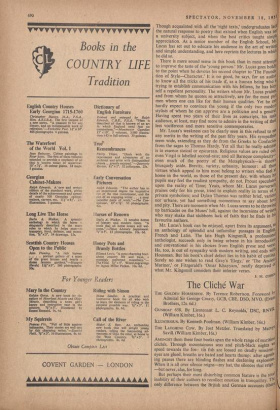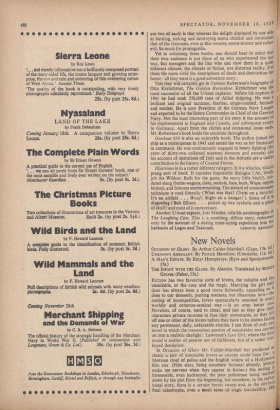The Clichd War
GUNBOAT 658. By Lieutenant L. C. Reynolds, DSC, RNVII. (William Kimber, 16s.) Inus-raious. By Kenneth Poolman. (William Kimber, 16s.) THE LAUGHING Cow. 13y Jost Metzler. Translated by MervY° Savill. (William Kimber, 16s.) AMONGST them these four books span the whole range of marit0 clichés. Through mountainous seas and pitch-black nights v''e speed towards the foe: tin fish are loosed on deadly missiofls. eyes are glued, breaths are bated and hearts thump: after agonis' ing pauses there are blinding flashes and deafening explosions When it is all over silence reigns-my hat, the silences that reig -but never, alas, for long.
But perhaps their most disturbing common feature is the to"' inability of their authors to recollect emotion in tranquillity. only difference between the British and German accounts 000' are two of each) is that whereas the delight displayed by our side at burning, sinking and destroying seems childish and outmoded, that of the Germans, even at this remove, seems sinister and rather evil. So much for propaganda.
Yet in criticising these books, one should bear in mind that their true audience is not those of us who experienced the last war, but teenagers and the like who can view them in a quite different climate; the climate of fiction, not distorted reality. For them the more vivid the descriptions of death and destruction the better : all they want is a good adventure story.
This they will certainly get in Terence Robertson's biography Of Otto Kretschmer, The Golden Horseshoe. Kretschrner was the most successful of all the U-boat captains : before his capture In 1941 he had sunk 350,000 tons of Allied shipping. He was 3 brilliant and original tactician, fearless, single-minded, humane and modest. He is now President of the German Navy League and expected to be the future Commander-in-Chief of the German Navy. Not the least interesting part of his story is the account ef his imprisonment in England and Canada, and subsequent return to Germany. Apart from the clichés and occasional loose ends, Mr. Robertson's book holds the attention throughout. Gunboat 658 is also an enjoyable book. The author joined his ship as a midshipman in 1943 and ended the war as her lieutenant in command. He was continuously engaged in heavy fighting (the crew of thirty-two collected nineteen honours and awards) and his account of operations off Italy and in the Adriatic are a useful contribution to the history of Coastal Forces. Illustrious is in a rather different category. It is a whacko, wizard prang sort of book. It contains impossible dialogue ('Ah, lovely job the Wildcat. Built for the game, the saucy little bitch'), out- dated slang (battle-wagons, clots, rockets, bats, beds, Wops, °pros, blokes), and fulsome sentimentalising. The streani of consciousness technique is used liberally ('What was that? Christ on a bicycle!) It's an airfield . . . Woof! Right on a hangar!'). Some of it Is disgusting (`Bob Ellison . . . picked up two eyeballs and a piece of skull') and most of it unnecessary.
Another U-boat captain, Jost Metzler, tells his autobiographY in The Laughing Cow. This i ; a rambling, diffuse story, redeemed only by the account of a daring mine-laying expedition into the harbours of Lagos and Takoradi. LUDOV1C KENNED1











































































 Previous page
Previous page